Welcome to today’s edition of ShentonSTAGE.
I returned from New York on Tuesday morning, and the next day, I was transported back to Broadway for the transfers of not one but two grand old Broadway classics from the 1940s and 50s respectively — Rodgers and Hammerstein’s 1943 OKLAHOMA! and Lerner and Loewe’s 1956 MY FAIR LADY — in revivals both of which I first saw in New York in 2018: Oklahoma! at Brooklyn’s St Ann’s Warehouse, ahead of its transfer to Broadway’s Circle in the Square; and My Fair Lady at Lincoln Center Theatre’s flagship home, the Beaumont Theatre.
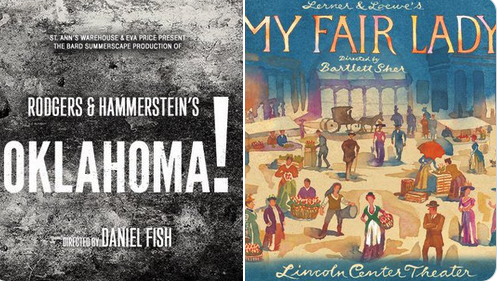
They’ve transferred to the Young Vic (to June 25 only) and the London Coliseum (for an extended spring and summer season to the end of August) respectively, which means — inevitably — that only Oklahoma’s confrontational intimacy with its audience is actually faithfully reproduced. My Fair Lady — though still sumptuous with its gorgeous costumes and 36-piece orchestra (against Oklahoma’s eight, though the leading man is also his own guitarist) — feels a little remote, even from the 4th row of the dress circle.
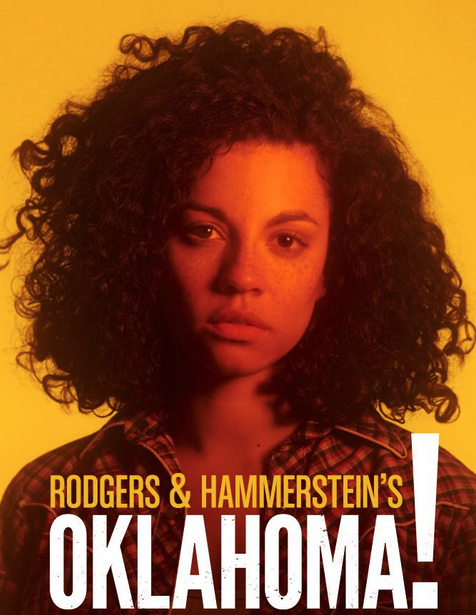
OKLAHOMA! is as outright astonishing as much as it is occasionally annoying, but as re-staged at the Young Vic, it is so exhilaratingly cast that I was swept away despite the occasional missteps. (I still find the over-emphatic dream ballet tiresome, and could also do without the scenes staged in utter darkness).
It does, however, utterly reclaim the show for today, from foreground its sexual allure over everything; for once, with Jud Fry played by blonde boy wonder Patrick Vaill (reprising his US performance in the show), you can understand Laurey (the wonderful Anoushka Lucas) being drawn to him, and also feel acutely the pain of his rejection. The bullying entitlement of Arthur Darvill’s less-than-sunny Curly is also full of complexity.

James Davis — again, reprising his US performance — is tremendous as Will Parker (fourth from the right in the curtain call picture above), who is in competition with dashing, Freddie Mercury lookalike Stavros Demetraki for the affections of Marisha Wallace’s scene-stealing Ado Annie (fifth from the right above); while veteran RSC and NT star actor Greg Hicks is luxury casting as Ado’s ever-watchful father Andrew Carnes (third from the right above), as is LIza Sadovy, fresh from her Olivier win for CABARET, as the earthy Aunt Eller.
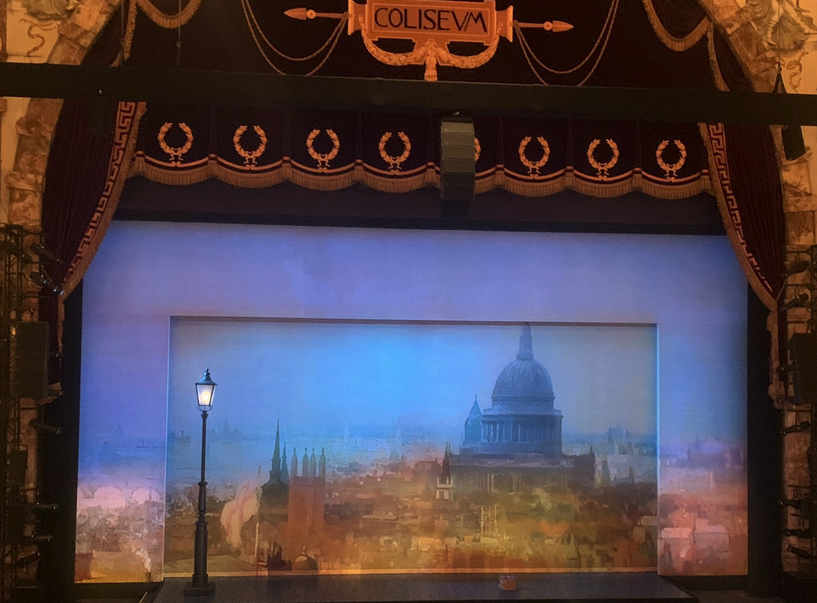
MY FAIR LADY is a more traditional beast of a show, a luxurious wallow in one of the most beautiful musical theatre scores ever written; but Bartlett Sher’s production overcomes the show’s dramatic longueurs to deliver a spellbinding portrait of a mutually controlling relationship.
While sex is freely expressed in Oklahoma!, here it is being seriously repressed, with Harry Hadden-Paton (reprising his Tony-nominated Broadway peformance, pictured below lefrt) as the commitment-avoidant Henry Higgins, preferring the intellectual challenge of turning Cockney Covent Garden flower-sellier Eliza Doolittle into a fit-for-high-society duchess than engaging with her as a human being.
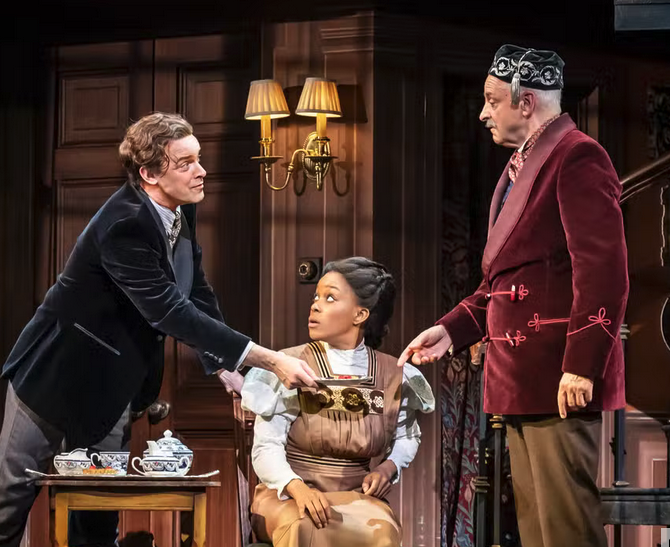
Amara Okereke — making history as London’s first black Eliza (above centre), after previously being London’s first black Cosette, which shouldn’t be a remarkable fact but is — is an effortless delight, as radiant of shimmering voice as she is beautiful, with scene-stealing contributions from stage veterans Malcolm Sinclair as Colonel Pickering (above right) and Vanessa Redgrave as Henry’s regal mother Mrs Higgins.
If truth be told, Bartlett Sher’s production — made for the thrust-stage of Lincoln Center’s Beaumont Theatre — looked better there than it does here, marooned on the vast Coliseum stage which it struggles to fill, even on the scale with which it is presented here.
But it is still a pleasure to have the show back in the West End for the first time since the debacle of Cameron Mackintosh’s transfer of the National’s 2001 production to Drury Lane, for which Martine McCutcheon’s Eliza may have won an Olivier award but for which her NT understudies (Alexandra Jay and second cover Kerry Ellis) gave more performances in the role than she did. McCutcheon was eventually released from her West End contract to play the role five months earlier than scheduled, when persistent vocal problems caused her to miss numerous performances (but which did not stop her being photographed on shopping excursions in the West End with Dale Winton at the time).
GREASE IS AN(OTHER) WORD….
Tomorrow afternoon I’ll be back at another American classic stage musical, GREASE — originally premiered off-Broadway before it became best known for its film version, and now returning to London in a new production that opened at the Dominion Theatre on Tuesday, previously original home to another long-running 90s revival, that yet again re-orders the show, drawing on different incarnations to create one more.
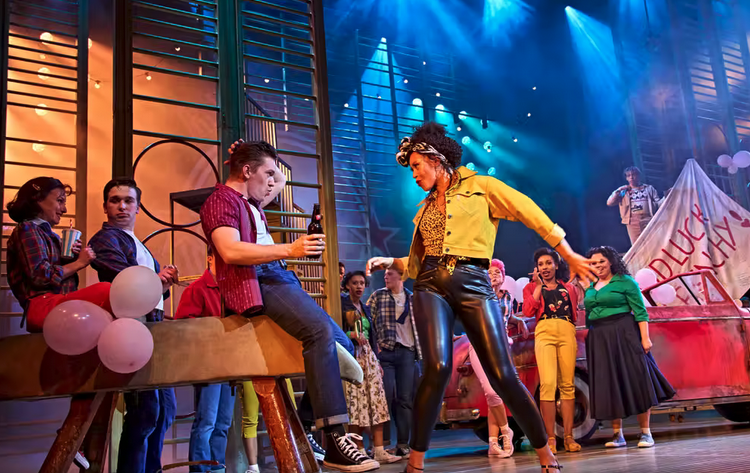
As Andrzej Lukowski’s review for Time Out itemises it, “If the basic, 1959-set plot about the high-school romance between greaser Danny Zucker and nice new girl Sandy Dumbrowski has remained constant, then almost everything else about ‘Grease’ has been chopped and changed at some point or other over the years. It’s a multiversal entity, with no two versions the same. Nikolai Foster’s big West End revival isn’t an aggressively dramatic reappraisal, like the version of Oklahoma! currently playing at the Young Vic. It’s more a careful sift through all the songs and story options available, that have then been pieced together into the hardest-edged version available, but without actually dramatically departing from precedent. Plus it’s got Peter Andre in it, who we’ll deal with later. Foster’s key decision is to reinstate swathes of the very first, 1971 version of the musical, which has never been performed professionally in this country (or indeed, outside of Chicago where the show originated). He’s held on to the big anthems added for the film – Grease is the Word, You’re the One that I Want – because obviously he doesn’t want an audience riot on his hands.”
In The Guardian, Lyndsey Winship calls Foster’s production “brightly entertaining ” and says it “blasts out room-filling energy in its big dance numbers by choreographer Arlene Phillips, with tight formations of sharp, rhythmic 50s motifs.”
But in a two-star review for the Evening Standard, NIck Curtis is less charmed: “Grim is the word. This version of the beloved 50s-set high school musical has a hard carapace of professionalism but underneath it’s colourless, charmless, and emptily energetic. The love story of bad boy Danny and goody two-shoes Sandy is insipid, and swamped by a tide of teen-drama clichés. The familiar songs still stand up, but only a few of the big numbers – Greased Lightning, Hopelessly Devoted to You and Hand Jive (here sounding alarmingly like ‘hand-job’) – have real vocal power or choreographic verve”.
Other openings of the week
A busy week of London openings also saw the world premiere of Beth Steel’s THE HOUSE OF SHADES (originally programmed for 2020, but delayed by the pandemic) on Tuesday in a production starring Anne-Marie Duff, and Anupama Chandrasekhar’s T`HE FATHER AND THE ASSASSIN, which tells the story of the man who murdered Gandhi, on Thursday. And in-between those two, Southwark Playhouse also offered a new production of Craig Adams and Ian Watson’s 2013 musical LIFT that originally premiered at Soho Theatre in 2013.
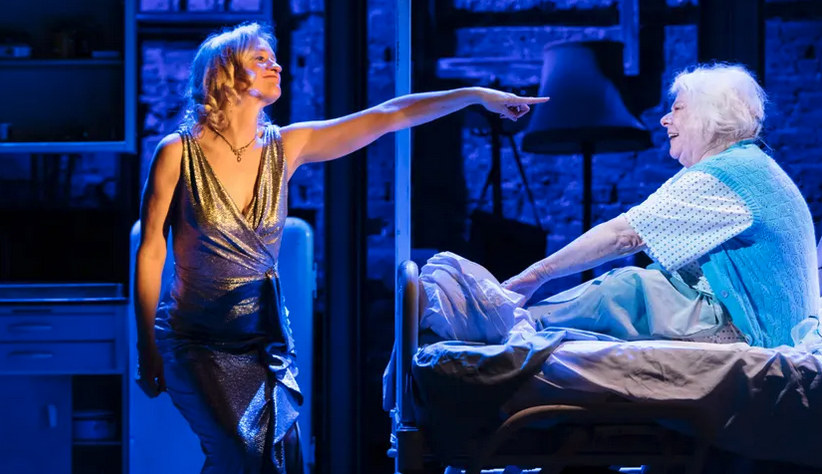
In a three-star review for The Guardian, Arifa Akbar writes of THE HOUSE OF SHADES, “Beth Steel’s large canvas reflects brawny ambition and magnificent fearlessness as the dead walk alongside the living and the surreal interrupts the real. It is a kitchen-sink drama that incorporates state-of-the-nation politics, and the generational damage within family life is shown largely through its women. Directed by Blanche McInturey, the play emanates a retro sitcom vibe at the start but detours into Dennis Potter territory, with hallucinatory scenes, seductive and dreamlike, often with song.”
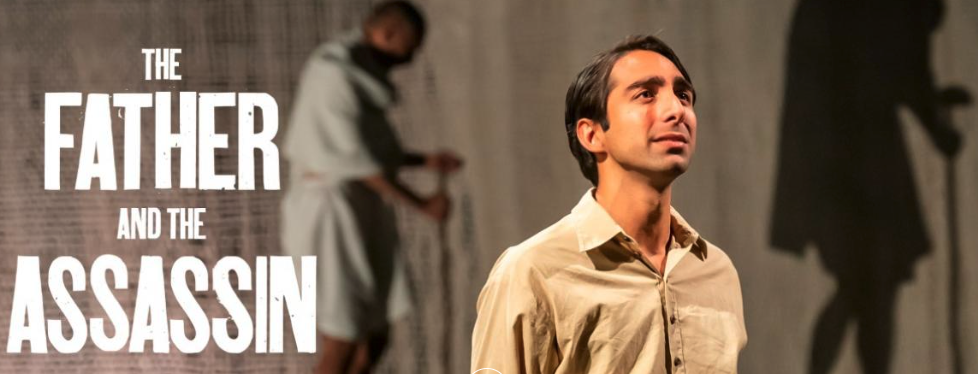
Writing for the Arts Desk, Heather Neill says that playwright Anupama Chandrasekhar’s described her idea for a play about Gandhi’s assassin Nathuram Godse to director Indhu Rubasingham during her time as the NT’s first international writer in residence. Rubasingham is now directing that play on the NT’s Olivier mainstage, and Neill writes, “Chandrasekhar offers, not an analysis of a historical person, but an agglomeration of a few facts with a suggestion of the ways in which political extremism can take hold…. The subject could scarcely be more serious – or more pertinent – given world politics, but solemnity is kept at bay and the audience, most of whom will have only a sketchy idea of the actual events, constantly acknowledged and deftly entertained. Emotion too is controlled; this is a play of ideas not feeling.”

In a three-star review of LIFT for WhatsOnStage, Mickey Jo Boucher writes, “Without having seen the show’s premiere production to compare, the plot remains far from clear, with a muddled sense of structure and identity that leaves it ultimately deeply unsatisfying and even inaccessible.” And yet, having told us he’s never seen it before, he then goes on to confidently proclaim that Craig Adams’ “contemporary score pulses with as much vitality and thrill as it did in 2013 and is even further enhanced in the capable hands of musical director Sam Young who has provided new arrangements and is presumably responsible for the rapturous vocal harmony.”
SEE YOU ON MONDAY
If you can’t wait that long, I may also be found on Twitter here: https://twitter.com/ShentonStage/ (though not as regularly on weekends
